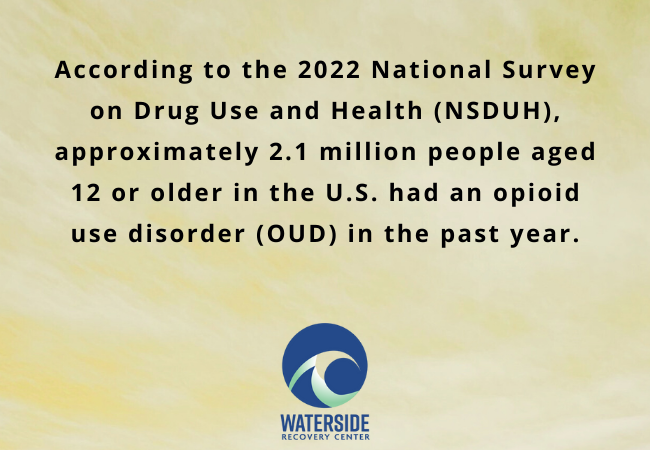Opiate addiction is a growing public health crisis that doesn’t just affect the present—it reshapes the future of those who suffer from it. While short-term use may begin with pain relief or recreational experimentation, long-term opiate addiction leads to serious physical, psychological, and social consequences.
At Waterside Recovery, we believe that early and consistent treatment is critical to preventing the irreversible effects of opiate addiction. Through our Day Treatment Program, Afternoon Treatment Program, and Outpatient Treatment Program in Massachusetts, we provide evidence-based, compassionate care that helps individuals regain control and rebuild their lives.
Understanding Opiate Addiction: A Chronic Disease
Opiates (also known as opioids) include prescription painkillers like oxycodone, hydrocodone, morphine, and illicit drugs like heroin and fentanyl. They are highly addictive, especially when used over extended periods or without medical supervision.
Opiate addiction is a chronic brain disease—not a moral failing. It alters brain chemistry, hijacks the reward system, and creates a compulsive need to use despite knowing the harm it causes.
At our Addiction Treatment Center in Massachusetts, we treat opiate addiction as a medical condition requiring a comprehensive and personalized approach.
The Long-Term Physical Effects of Opiate Addiction
Prolonged opiate use has serious effects on nearly every organ system:
Brain Damage and Cognitive Impairment
- Long-term use reduces gray matter in the brain
- Impairs memory, decision-making, and attention span
- Alters mood regulation and increases risk of depression and anxiety
Cardiovascular Issues
- Increased risk of heart infections (endocarditis) from injection use
- Slowed heart rate and low blood pressure
- Dangerous arrhythmias and risk of heart attack
Respiratory Depression
- Opiates suppress the respiratory system
- Long-term use increases the risk of life-threatening breathing problems, especially during sleep
Chronic Pain and Bone Loss
- Ironically, long-term users often develop opioid-induced hyperalgesia, a condition where they feel more pain, not less
- Reduces bone density and increases fracture risk
Gastrointestinal Damage
- Chronic constipation and bowel obstruction
- Nausea, vomiting, and appetite suppression
These issues highlight why long-term opiate use must be addressed with clinical care from a trusted Massachusetts Addiction Treatment Center like Waterside Recovery.
Psychological and Emotional Impact of Long-Term Use
Opiate addiction doesn’t just affect the body—it takes a deep toll on the mind and spirit.
Increased Risk of Mental Illness
- Prolonged use is linked to higher rates of depression, anxiety, and suicidal ideation
- Emotional blunting and inability to feel pleasure (anhedonia)
Behavioral Changes
- Secretive or manipulative behavior
- Loss of interest in hobbies, work, or relationships
- Poor impulse control and increased risk-taking
Social Isolation and Shame
- Long-term addiction often leads to estrangement from family and friends
- Deep shame and guilt create barriers to seeking help
These emotional consequences are just as dangerous as physical ones—and often harder to see. Our Drug Addiction Treatment Program in Massachusetts addresses both, using therapy, community, and education to support lasting recovery.
How Opiate Addiction Destroys Quality of Life
The longer opiate addiction continues untreated, the more devastating its social effects become.
Loss of Employment and Financial Stability
- Absenteeism, job loss, and difficulty holding employment
- Draining financial resources to obtain substances
Family Breakdown
- Marriages and parenting relationships often fracture under the strain
- Trust is broken and communication breaks down
Legal Consequences
- Arrests for possession, theft, or driving under the influence
- Involvement with child protective services
These impacts ripple outward—harming not just the individual but everyone in their life. That’s why seeking treatment through our Day Treatment Program in Massachusetts can stop the damage and start the healing process.
Why Treatment Is Crucial—And Urgent
Many people believe they can stop opiate use on their own. But research shows that professional treatment dramatically improves recovery outcomes.
At Waterside Recovery, our multidisciplinary approach includes:
- Medical detox coordination to manage withdrawal safely
- Individual and group therapy to address trauma and build coping skills
- Medication-Assisted Treatment (MAT) using Suboxone, naltrexone, or methadone
- Relapse prevention planning
- Dual diagnosis treatment for co-occurring mental health conditions
Each client receives a customized treatment plan that matches their unique needs across our Afternoon Treatment Program Massachusetts and outpatient services.
The Impact of Opiate Addiction on Brain Chemistry and Reward
Opiates hijack the brain’s reward system, flooding it with dopamine and teaching the brain to seek drugs over natural pleasures. Over time:
- The brain loses its ability to feel joy without substances
- Everyday rewards—family, food, achievement—feel flat
- Motivation, memory, and decision-making deteriorate
This rewiring creates a cycle of dependency that becomes harder to escape the longer it goes untreated. At our Drug Addiction Treatment Program in Massachusetts, we use therapy and evidence-based care to help clients rebuild healthy neural pathways.
The Genetic and Generational Consequences of Opiate Use
Opiate addiction doesn’t just affect one person—it can impact families and future generations. Long-term use:
- Alters genetic expression related to stress and addiction
- Increases the risk of addiction in children of those with opioid dependence
- Creates generational trauma, especially in families with co-occurring neglect or abuse
Our Addiction Treatment Center Massachusetts offers family therapy and intergenerational healing, recognizing that breaking the cycle requires more than individual recovery—it takes family restoration.
Chronic Relapse and the Dangers of Tolerance
Long-term users build tolerance—needing more of the drug to get the same effect—and eventually face:
- Higher overdose risk from escalating doses
- More severe withdrawal symptoms
- Increased likelihood of relapse, especially after short-term abstinence
Many clients cycle in and out of detox or short-term programs without receiving the ongoing support needed for sustained recovery. That’s why our Day Treatment and Afternoon Programs in Massachusetts are structured to support clients through the vulnerable post-detox phase and into long-term stability.
Opiate Use and the Risk of Overdose—Why Time Matters
Every day without treatment increases the risk of overdose. The CDC reports over 100,000 drug overdose deaths in a recent 12-month period, with opioids involved in nearly 75% of them.
What makes opiate overdose so deadly?
- Respiratory depression causes the body to stop breathing
- Tolerance resets after short abstinence, making relapse doses fatal
- Fentanyl contamination in heroin and counterfeit pills increases overdose risk even from a single use
Treatment is not just about recovery—it’s about survival.
Waterside Recovery integrates overdose education, MAT, and relapse prevention into every treatment plan to keep our clients safe and alive.
What Long-Term Recovery Looks Like After Opiate Addiction
Recovery isn’t just about stopping drug use—it’s about rebuilding a life you want to stay sober for. At Waterside Recovery, we help clients create that life through:
- Goal-setting and vocational training
- Mindfulness and emotional regulation techniques
- Alumni and peer support groups
- Aftercare planning with our Outpatient Treatment Program in Massachusetts
Long-term recovery is possible. We’ve seen clients go from hopelessness to homeownership, from detox to degree, from isolation to purpose. It starts with getting the right help—and staying connected to it.

Our Continuum of Care for Opiate Addiction
Day Treatment Program Massachusetts
- Structured, full-day clinical care
- Ideal for those stepping down from detox or inpatient rehab
Afternoon Treatment Program Massachusetts
- Half-day programming for those needing flexibility
- Perfect for clients balancing school, work, or parenting
Outpatient Treatment Program Massachusetts
- Ongoing counseling and peer support
- Maintenance stage for relapse prevention and long-term success
Our team ensures that no matter where you are in your recovery journey, there’s a program that meets you where you are.
How Early Treatment Reverses Long-Term Damage
While long-term damage from opiate use can be severe, the good news is that much of it is reversible—if treatment begins early enough.
Benefits of Getting Help Early:
- Cognitive function can improve with sustained sobriety
- Organs often recover with proper care and nutrition
- Mental health improves with dual diagnosis treatment
- Relationships can be repaired through counseling and family support
- Hope, purpose, and stability return over time
At Waterside Recovery, we’ve seen hundreds of lives transformed through timely, evidence-based care.
Why Choose Waterside Recovery?
Choosing the right treatment center makes all the difference. At Waterside Recovery, we offer:
- Evidence-based therapies and MAT integration
- Experienced addiction and mental health professionals
- Multiple levels of care: Day, Afternoon, and Outpatient Programs
- Family involvement and aftercare planning
- A compassionate, judgment-free environment
Our Addiction Treatment Center in Massachusetts is designed to help you feel safe, supported, and seen—every step of the way.
Conclusion
The long-term effects of opiate addiction can feel overwhelming—but treatment offers hope, healing, and a way forward. Whether you’ve struggled for months or years, recovery is possible—and it starts with one courageous step.
If you or a loved one is living with the effects of opiate addiction, don’t wait another day. Call Waterside Recovery at 866.671.8620 to learn how our expert team and customized programs can help you reclaim your life—starting now.
FAQ on Opiate Addiction
What are the long-term physical effects of opiate addiction?
Chronic opiate use can damage the brain, respiratory system, heart, digestive tract, and bones. It may also lead to chronic pain, hormonal imbalances, and increased risk of overdose.
How does opiate addiction affect mental health over time?
Long-term use is linked to depression, anxiety, emotional numbness, and increased suicide risk. It also causes cognitive issues like memory loss and poor decision-making.
Can the brain recover after long-term opiate use?
Yes, with sustained sobriety and therapy, the brain can begin to heal. Cognitive function often improves significantly within the first year of recovery.
Is it possible to reverse the damage caused by opiates?
Some damage—like emotional, social, and even certain physical impairments—can be healed or improved through early, structured treatment and support.
Why is treatment for opiate addiction urgent?
Delaying treatment increases the risk of overdose, chronic health issues, and permanent brain changes. The longer the addiction continues, the more difficult and dangerous it becomes.
What types of treatment are offered at Waterside Recovery?
We provide Day Treatment, Afternoon Treatment, and Outpatient care, including therapy, medication-assisted treatment (MAT), relapse prevention, dual diagnosis support, and holistic recovery tools.
What is the difference between Day and Afternoon Treatment Programs?
Our Day Treatment Program Massachusetts offers full-time care with intensive clinical support. The Afternoon Treatment Program is a part-time option ideal for those with daytime commitments.


